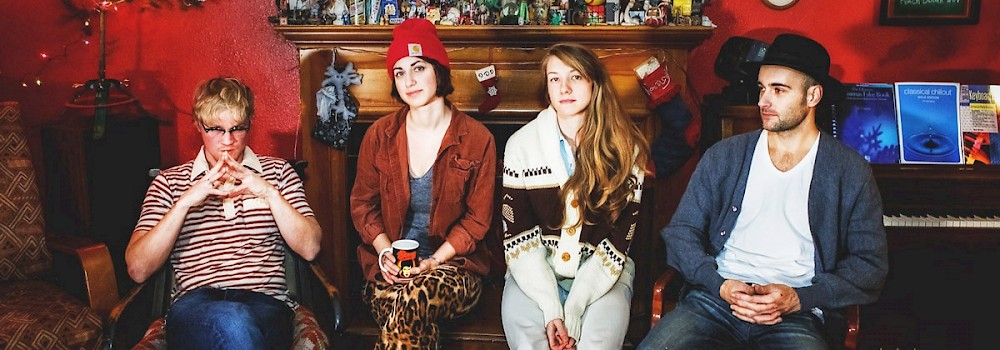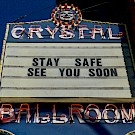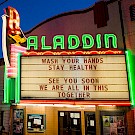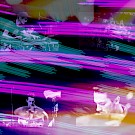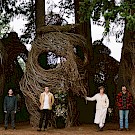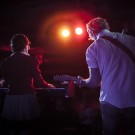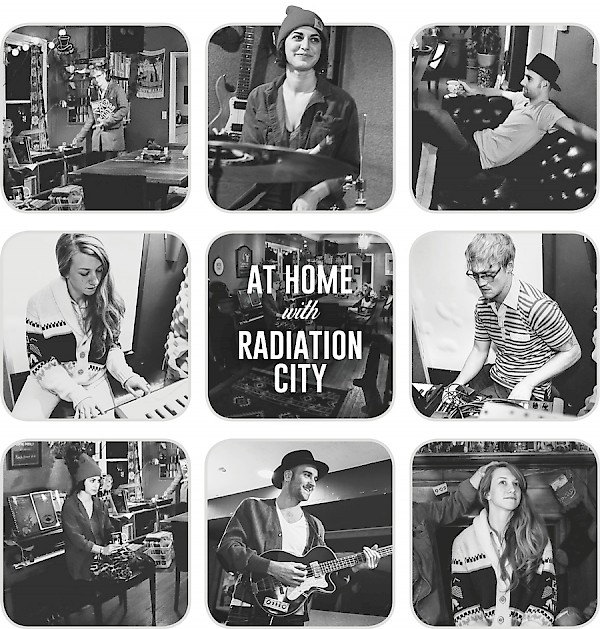
The day starts with an email: “Meet us at The Green House.”
A few hours later, I find myself on the doorstep of a house in a quiet NE Portland neighborhood and see those same three words—The Green House—scribbled on a large window.
Patti King (keys/vocals) greets me at the door and guides me through a dimly lit living room where an old Som Imaginário record spins in the corner, filling the air with meandering sounds of experimental psychedelic rock. Flanked by a plastic dinosaur and a ’90s wrestling action figure, a dusty Rudy Fernandez bobblehead nods along to the beat on a crowded mantle.
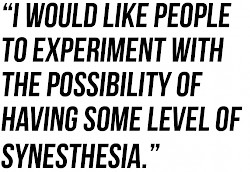 As we head downstairs, I notice a large collection of potted plants—a clue about the home’s nickname? Or maybe that has more to do with the jars of Sour Diesel—fresh from a local marijuana dispensary—serving as a makeshift centerpiece on the living room table.
As we head downstairs, I notice a large collection of potted plants—a clue about the home’s nickname? Or maybe that has more to do with the jars of Sour Diesel—fresh from a local marijuana dispensary—serving as a makeshift centerpiece on the living room table.
At the bottom of a winding stairway, we make our way to the heart of The Green House. Here, I find Cameron Spies (guitar/vocals) tidying up an impressive home studio where the bright, silky sounds of the group’s new album, Synesthetica, first took shape.
Home to a diverse collection of talented roommates—including Randy Bemrose (drums/bass), King and Unknown Mortal Orchestra’s Riley Geare—I realize I’m standing in the kind of house so many Portland transplants dream of finding when they decide to move here. Like the eclectic decor covering the walls, a wide range of ideas, talents, tastes, lifestyles, and creative influences swirl together under one roof. Best of all, a state-of-the-art home studio sits below, waiting to document it all.
Known for their ability to cleverly mix sonic influences ranging from ’60s orchestral music to modern dream pop, Radiation City pushed themselves to blend even more aspects of their daily lives as they worked on a third full-length album, the first with new label Polyvinyl.
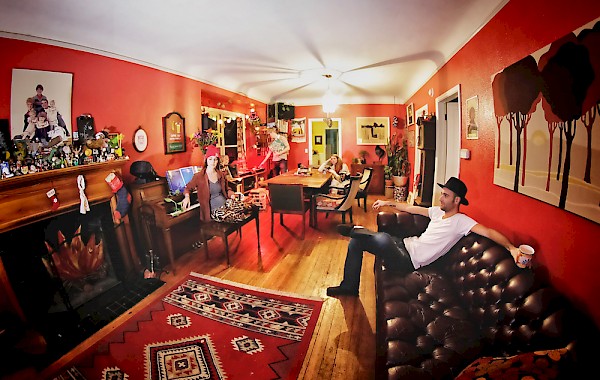 “I feel really lucky that we get to do this as a career and explore so many things,” Spies tells me. “We get to make art in multiple disciplines and don’t have to do things in such a regimented way. It’s so easy to compartmentalize things in your daily life and get so focused on the details that you can’t let go and let those things live freely amongst each other.” He continues, “Synesthetica is the template for that: Living your daily life with that idea of blending senses and blending disciplines.”
“I feel really lucky that we get to do this as a career and explore so many things,” Spies tells me. “We get to make art in multiple disciplines and don’t have to do things in such a regimented way. It’s so easy to compartmentalize things in your daily life and get so focused on the details that you can’t let go and let those things live freely amongst each other.” He continues, “Synesthetica is the template for that: Living your daily life with that idea of blending senses and blending disciplines.”
For Lizzy Ellison (keys/vocals) this comes naturally as a result of synesthesia—a neurological condition that triggers sensations of color when she hears music.
“I would like people to experiment with the possibility of having some level of synesthesia. I think that the record is really, really colorful,” Ellison says, perched on the edge of a piano bench. “And even if you don’t relate it to colors, how does this influence you? What does this make you want to create? How does this overlap into your life?”
On top of influencing how she perceives the music she makes, synesthesia has inspired her (and the rest of the band) to experiment with combining other creative and sensory experiences as well. In August, Radiation City curated a night at Holocene under the same name as the record that brought local poets, actors, visual artists, dancers, storytellers, and DJs together in the same room. They even reached out to artists for scratch and sniffs to complete the experience.
“It really just plays into the idea of wanting to live in a perfect world where you can have rap and you can have indie rock and you can have weird abstract visual art all in the same place and it doesn’t have to be separated,” Ellison explains.
This willingness to combine unexpected elements shows itself all over the record.
Synesthetica is full of what Ellison affectionately refers to as “bangers”: sparkling, groove-heavy musical arrangements washed in bright synthesizers and dotted with infectious singalong-friendly hooks. More often than not, however, these uplifting sounds are accompanied by “very dark, personal lyrics,” as Spies puts it.
“The song ‘Futures’ is about feeling super ostracized by my dad and wanting to shame him in front of people, but in this really playful way,” Ellison says about a track that could be easily confused for a bubbly soundtrack to a carefree day at the beach if you didn’t know any better.
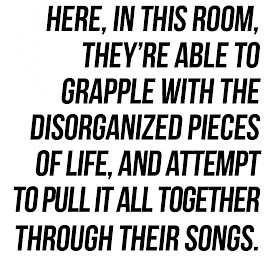 As I find out, this emotional duality mirrors a rocky past two years for the band. At one point, the group’s founding couple (Spies and Ellison) temporarily broke up and cancelled a wedding.
As I find out, this emotional duality mirrors a rocky past two years for the band. At one point, the group’s founding couple (Spies and Ellison) temporarily broke up and cancelled a wedding.
The creative process wasn’t much smoother. Traditionally a democratic band that likes to involve all members in the creative process, they had a hard time coming to a consensus on important decisions this time around. Ultimately, Spies and Ellison went to record the album in San Francisco with John Vanderslice (Death Cab For Cutie, Spoon) and left the others at home.
They weren’t pleased with the album when they returned home, though. Even with the big-name producer and all the fancy equipment available to them at Tiny Telephone Recording, they admit that they didn’t end up with an album they loved until they came back to Portland and pieced together these new recordings with original demos they had recorded themselves in the basement of The Green House.
As I watch photographer Autumn Andel shoot a series of photos with them down in that room, I begin to understand why. Posing with their instruments, they can’t help but improvise a bouncy little riff together. They joke around and swap instruments. For the first time all evening, I see them completely at ease with each other and with themselves.
Bemrose had just told me, “Over the course of two years, we did a trial-and-error method of making an album that we didn’t like for a long time during which the band was going through great personal tumult.” But you wouldn’t know it looking at them in this room now. This is where they come to make sense of that tumult. Here, in this room, they’re able to grapple with the disorganized pieces of life, and attempt to pull it all together through their songs.
As the evening draws to a close, we walk back upstairs and Andel notices that the Som Imaginário record has stopped playing. With a frown, she quietly says, “Oh, the music stopped...”
“Yeah, it’s always sad when the music stops,” King responds. Then she chuckles, “That’s why we’re always making it.”

